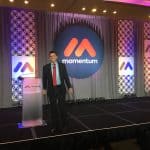Modeled after the intellectual programs of ancient Greece, the Marian Miner Cook Athenaeum at Claremont McKenna College (California) is a unique forum in American higher education. Four nights a week, the “Ath” welcomes scholars, public figures, thought leaders, artists and innovators to campus to engage with students on a wide range of topics.
There was an elegance to the event. Despite a long day of class and extracurricular activities, students dressed up by the hundreds for an evening of intellectual stimulation, debate and collegiality. I used the opportunity to speak about the future of America’s healthcare system, hoping to inspire optimism and spur the students’ curiosity.
They came very well prepared. And by evening’s end, I was most impressed by the insightful and probing questions they asked. Three, in particular, stood out:
1. What do you think of the NYU School Of Medicine’s decision to offer tuition-free education to all students?
With dozens of premeds in the room facing hundreds of thousands of dollars in student loans, this was a topic of great interest. Many leaned forward to hear my thoughts. I opined that medical school should be free, but all graduates should be required to work for two years in an under-resourced geography, similar to medical education that is paid for by the military.
This approach would relieve the debt burden, level the playing field for future doctors and, hopefully, attract more doctors to America’s inner cities and rural geographies.
2. What does the future of medical technology hold?
Two technologies will radically alter care delivery in the not-so-distant future: video and artificial intelligence (AI).
I believe that 30% of what is done in a doctor’s office today will be replaced with video solutions, which will greatly improve the patient experience (saving them a trip to the doctor’s office on a weekday in rush-hour traffic) while, in many cases, improving the quality of care provided.
I also pointed to the potential for artificial intelligence to greatly improve diagnostic and medical outcomes. Already, AI has proven more reliable than the human eye when it comes to pattern recognition in the fields of radiology, pathology and certain aspects of dermatology. When humans perform these functions, they use heuristics: rules of thumb that tell them if there is a problem. In contrast, AI can learn from tens of thousands of patients and studies by correlating the diagnosis with the images presented. Doctors are unlikely to improve their visual skills in years to come. But we can be certain that AI technologies will continue to advance. Both doctors and patients should welcome these improvements.
3. What would you say to students interested in becoming physicians?
Three things: First, medicine is the best profession in the world. Each day, physicians have the chance to make life better for others. Second, those who choose this path must study hard in order to become the best doctor they can be. Third, because doctors today face many administrative obstacles – insurance claims and regulations that can chip away at professional satisfaction – it’s important for doctors to never lose their passion for medicine and to never forget what inspired them to choose this profession in the first place.
I would like to thank all the students, faculty, staff, and community members who joined this discussion and asked important questions about the future of medicine. And, finally, a very special thank-you to Priya Junnar, Director of the Marian Miner Cook Athenaeum, along with Woolley Fellows, Hamsa Srikanth (Economics) and Bruno Youn (Philosophy, Politics, and Economics), who help coordinate Athenaeum events and facilitate such excellent dialogue.
Dr. Robert Pearl is the former CEO of The Permanente Medical Group, the nation’s largest physician group. He’s the bestselling author of “Mistreated: Why We Think We’re Getting Good Health Care–And Why We’re Usually Wrong” and a Stanford University professor. Follow him on Twitter @RobertPearlMD.






